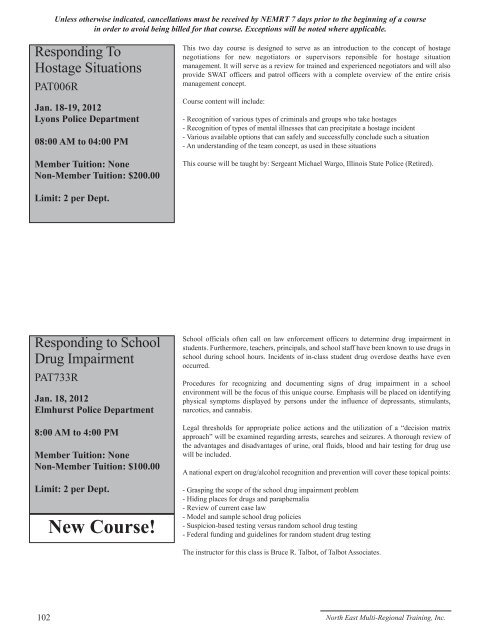New Course! - North East Multi-Regional Training, Inc.
New Course! - North East Multi-Regional Training, Inc.
New Course! - North East Multi-Regional Training, Inc.
You also want an ePaper? Increase the reach of your titles
YUMPU automatically turns print PDFs into web optimized ePapers that Google loves.
Responding To<br />
Hostage Situations<br />
PAT006R<br />
Jan. 18-19, 2012<br />
Lyons Police Department<br />
08:00 AM to 04:00 PM<br />
Member Tuition: None<br />
Non-Member Tuition: $200.00<br />
Limit: 2 per Dept.<br />
Responding to School<br />
Drug Impairment<br />
PAT733R<br />
Jan. 18, 2012<br />
Elmhurst Police Department<br />
8:00 AM to 4:00 PM<br />
Member Tuition: None<br />
Non-Member Tuition: $100.00<br />
Limit: 2 per Dept.<br />
102<br />
Unless otherwise indicated, cancellations must be received by NEMRT 7 days prior to the beginning of a course<br />
in order to avoid being billed for that course. Exceptions will be noted where applicable.<br />
<strong>New</strong> <strong>Course</strong>!<br />
This two day course is designed to serve as an introduction to the concept of hostage<br />
negotiations for new negotiators or supervisors reponsible for hostage situation<br />
management. It will serve as a review for trained and experienced negotiators and will also<br />
provide SWAT officers and patrol officers with a complete overview of the entire crisis<br />
management concept.<br />
<strong>Course</strong> content will include:<br />
- Recognition of various types of criminals and groups who take hostages<br />
- Recognition of types of mental illnesses that can precipitate a hostage incident<br />
- Various available options that can safely and successfully conclude such a situation<br />
- An understanding of the team concept, as used in these situations<br />
This course will be taught by: Sergeant Michael Wargo, Illinois State Police (Retired).<br />
School officials often call on law enforcement officers to determine drug impairment in<br />
students. Furthermore, teachers, principals, and school staff have been known to use drugs in<br />
school during school hours. <strong>Inc</strong>idents of in-class student drug overdose deaths have even<br />
occurred.<br />
Procedures for recognizing and documenting signs of drug impairment in a school<br />
environment will be the focus of this unique course. Emphasis will be placed on identifying<br />
physical symptoms displayed by persons under the influence of depressants, stimulants,<br />
narcotics, and cannabis.<br />
Legal thresholds for appropriate police actions and the utilization of a “decision matrix<br />
approach” will be examined regarding arrests, searches and seizures. A thorough review of<br />
the advantages and disadvantages of urine, oral fluids, blood and hair testing for drug use<br />
will be included.<br />
A national expert on drug/alcohol recognition and prevention will cover these topical points:<br />
- Grasping the scope of the school drug impairment problem<br />
- Hiding places for drugs and paraphernalia<br />
- Review of current case law<br />
- Model and sample school drug policies<br />
- Suspicion-based testing versus random school drug testing<br />
- Federal funding and guidelines for random student drug testing<br />
The instructor for this class is Bruce R. Talbot, of Talbot Associates.<br />
<strong>North</strong> <strong>East</strong> <strong>Multi</strong>-<strong>Regional</strong> <strong>Training</strong>, <strong>Inc</strong>.



